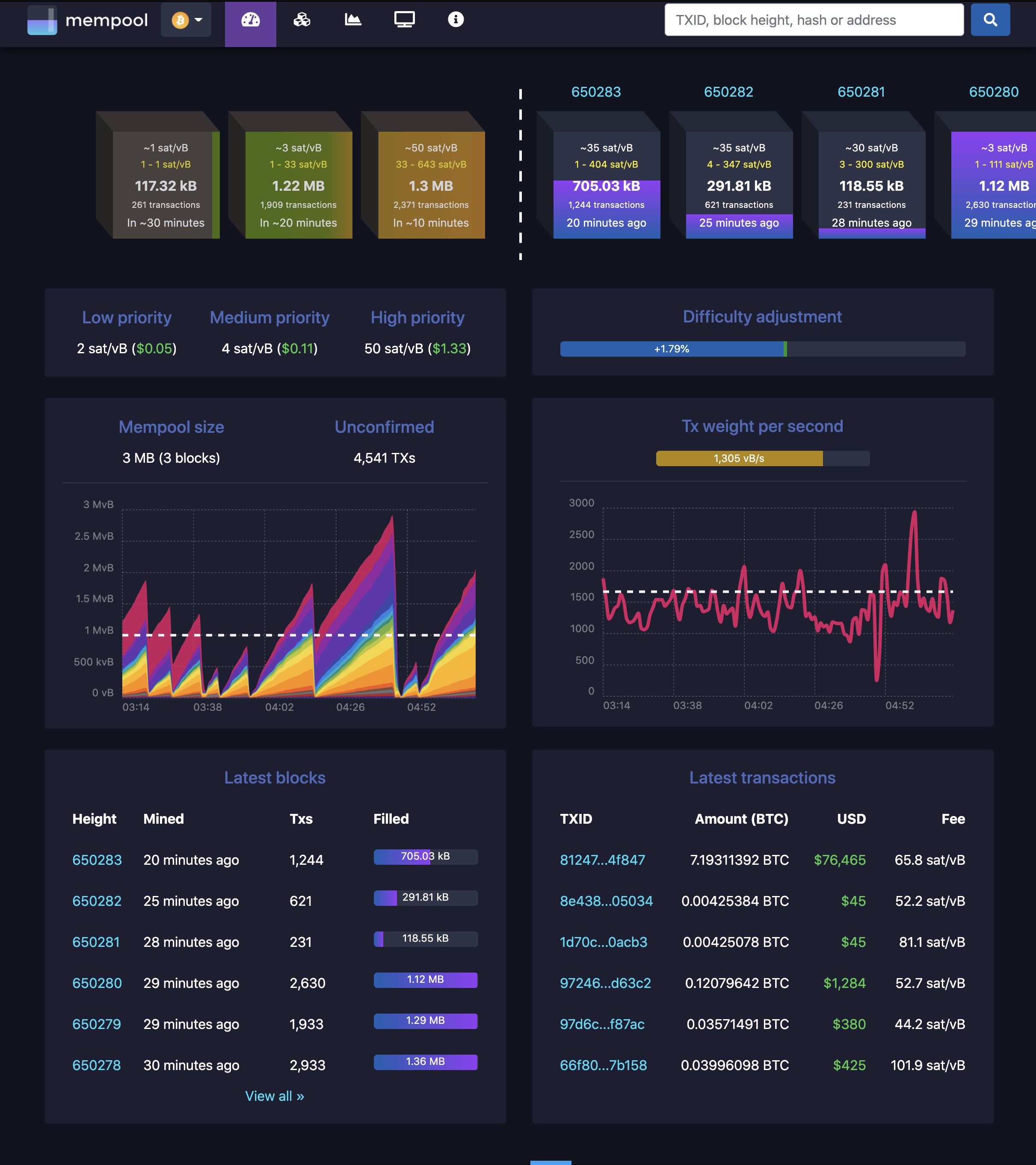Mempool is the fully featured mempool visualizer and block explorer website and API service running on mempool.space. The instructions below are for most users at home running on low-powered Raspberry Pi devices, but if you want to run a production website on a powerful server, see the production setup guide
- Bitcoin Core (no pruning, txindex=1)
- Electrum Server (romanz/electrs)
- NodeJS (official stable LTS)
- MariaDB (default config)
- Nginx (use supplied nginx.conf and nginx-mempool.conf)
Clone the mempool repo, and checkout the latest release tag:
git clone https://github.com/mempool/mempool
cd mempool
latestrelease=$(curl -s https://api.github.com/repos/mempool/mempool/releases/latest|grep tag_name|head -1|cut -d '"' -f4)
git checkout $latestreleaseEnable RPC and txindex in bitcoin.conf:
rpcuser=mempool
rpcpassword=71b61986da5b03a5694d7c7d5165ece5
txindex=1Install MariaDB from OS package manager:
# Linux
apt-get install mariadb-server mariadb-client
# macOS
brew install mariadb
brew services start mariadbCreate database and grant privileges:
MariaDB [(none)]> drop database mempool;
Query OK, 0 rows affected (0.00 sec)
MariaDB [(none)]> create database mempool;
Query OK, 1 row affected (0.00 sec)
MariaDB [(none)]> grant all privileges on mempool.* to 'mempool'@'%' identified by 'mempool';
Query OK, 0 rows affected (0.00 sec)From the mempool repo's top-level folder, import the database structure:
mysql -u mempool -p mempool < mariadb-structure.sqlInstall mempool dependencies from npm and build the backend:
# backend
cd ../backend/
npm install
npm run buildIn the backend folder, make a copy of the sample config and modify it to fit your settings.
cp mempool-config.sample.json mempool-config.jsonEdit mempool-config.json to add your Bitcoin Core node RPC credentials:
{
"MEMPOOL": {
"NETWORK": "mainnet",
"BACKEND": "electrum",
"HTTP_PORT": 8999,
"API_URL_PREFIX": "/api/v1/",
"POLL_RATE_MS": 2000
},
"CORE_RPC": {
"USERNAME": "mempool",
"PASSWORD": "71b61986da5b03a5694d7c7d5165ece5"
},
"ELECTRUM": {
"HOST": "127.0.0.1",
"PORT": 50002,
"TLS_ENABLED": true,
},
"DATABASE": {
"ENABLED": true,
"HOST": "127.0.0.1",
"PORT": 3306,
"USERNAME": "mempool",
"PASSWORD": "mempool",
"DATABASE": "mempool"
},
"STATISTICS": {
"ENABLED": true,
"TX_PER_SECOND_SAMPLE_PERIOD": 150
}
}Start the backend:
npm run startWhen it's running you should see output like this:
Mempool updated in 0.189 seconds
Updating mempool
Mempool updated in 0.096 seconds
Updating mempool
Mempool updated in 0.099 seconds
Updating mempool
Calculated fee for transaction 1 / 10
Calculated fee for transaction 2 / 10
Calculated fee for transaction 3 / 10
Calculated fee for transaction 4 / 10
Calculated fee for transaction 5 / 10
Calculated fee for transaction 6 / 10
Calculated fee for transaction 7 / 10
Calculated fee for transaction 8 / 10
Calculated fee for transaction 9 / 10
Calculated fee for transaction 10 / 10
Mempool updated in 0.243 seconds
Updating mempoolInstall mempool dependencies from npm and build the frontend static HTML/CSS/JS:
# frontend
cd frontend
npm install
npm run buildInstall the output into nginx webroot folder:
sudo rsync -av --delete dist/mempool/ /var/www/html/Install the supplied nginx.conf and nginx-mempool.conf in /etc/nginx
# install nginx and certbot
apt-get install -y nginx python-certbot-nginx
# install the mempool configuration for nginx
cp nginx.conf nginx-mempool.conf /etc/nginx/nginx.conf
# replace example.com with your domain name
certbot --nginx -d example.com
If everything went okay you should see the beautiful mempool 😁
If you get stuck on "loading blocks", this means the websocket can't connect. Check your nginx proxy setup, firewalls, etc. and open an issue if you need help.
